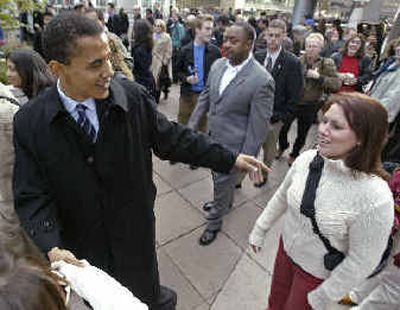GOP adds to congressional muscle

WASHINGTON – As Republicans celebrated their emphatic victory in Tuesday’s congressional elections, perhaps the biggest prize of all was knocking off Senate Minority Leader Tom Daschle of South Dakota. No more will the reserved, smooth-talking Democratic leader be there to block GOP initiatives and President Bush’s nominees.
To his Democratic colleagues, Daschle had been a shrewd tactician who bedeviled Republican ambitions by throwing up legislative roadblocks or organizing filibusters. To Republicans like Sen. George Allen, R-Va., chairman of the National Republican Senatorial Committee, he was “the obstructionist-in-chief.”
No one is sure what the new political dynamics will be in the Senate in 2005 with Daschle out and four new Republican senators in, but the GOP will have more votes to support the president and will no doubt remind Democrats that the public had not supported their agenda.
Throwing up resistance to the president could be politically trickier in the wake of the Bush victory, which emboldened the White House. The Senate will be the main forum for determining what kind and how much opposition will develop in a second term.
Democrats will have fewer forces to stand in the way of a conservative Bush agenda that likely will include overhauling Social Security and the federal tax code, as well as making his tax cuts permanent. And the White House is expected to push even harder for a proposal to allow oil drilling in Alaska’s Arctic National Wildlife Refuge.
Although Republicans will only have 55 of the 60 votes required to break a filibuster, that job will now be easier. They will have more of a head start in assembling a GOP-Democratic coalition to defeat filibusters, which are procedural maneuvers for blocking a vote.
Daschle became the first Senate leader in 52 years to lose a re-election campaign. The GOP grabbed control by ousting the Senate Democratic leader and sweeping six open seats in the South and southwest. Republicans lost seats in Illinois and Colorado, but GOP senators in Kentucky and Alaska beat back tough challengers.
The South Dakotan conceded Wednesday morning, saying, “Beginning in January, I may not serve in the Senate, but that work is not done. And I will continue to work for the state of South Dakota and the people of our state, so long as I have an opportunity to do so.”
But it will be difficult for Daschle to exert much influence in Washington anymore. There likely will be a scramble to replace him as Democratic leader, with Sen. Harry Reid, D-Nev., given the inside track. Sens. Chris Dodd, D-Conn., and Dick Durbin, D-Ill., are also considered possible candidates.
Durbin said Tuesday night that he expected to see more political polarization in the Senate in 2005. “It means more of the same, I’m afraid,” he said.
The new Senate will have a more conservative cast with new members owing much to the president. The Senate will have 55 Republicans, 44 Democrats and one independent, Sen. James Jeffords from Vermont, who often aligns himself with Democrats.
Sen. Lincoln Chafee, R-R.I., however, told the Providence Journal that he might consider switching parties in the wake of Bush’s victory.
“I’m not ruling it out,” said Chafee, a moderate who often votes with Democrats anyway. In Tuesday’s elections, the senator voted for Bush’s father, former President George H.W. Bush, as a “symbolic protest” against the president’s policies.
Former Rep. John Thune of South Dakota ended Daschle’s career by saying Daschle was too liberal for the state and had obstructed the GOP agenda.
“I think we have a strong majority, and will be able to accomplish a lot,” he said after his victory.
But Sen.-elect Barack Obama, D-Ill., noted on NBC’s “Today” show that the GOP doesn’t have 60 votes. “My hope would be that they recognize that, and the Democrats are willing to serve as a loyal opposition.”
Obama was one of the few Democratic bright spots in the election. Another was Ken Salazar in Colorado, who defeated Republican businessman Peter Coors.
The House, under Speaker Dennis Hastert, R-Ill., seemed destined to become slightly more Republican, as the GOP extended its decade-long control of the chamber. Republicans had won 207 seats and were leading in 22 others. That would give them 229 seats, 11 more than needed for control. They now have 227 seats.
The GOP defeated four veteran Texas Democratic congressmen, thanks chiefly to a controversial redistricting plan pushed by House Majority Leader Tom DeLay, R-Texas. But Republican Phil Crane’s loss in Illinois softened the blow.